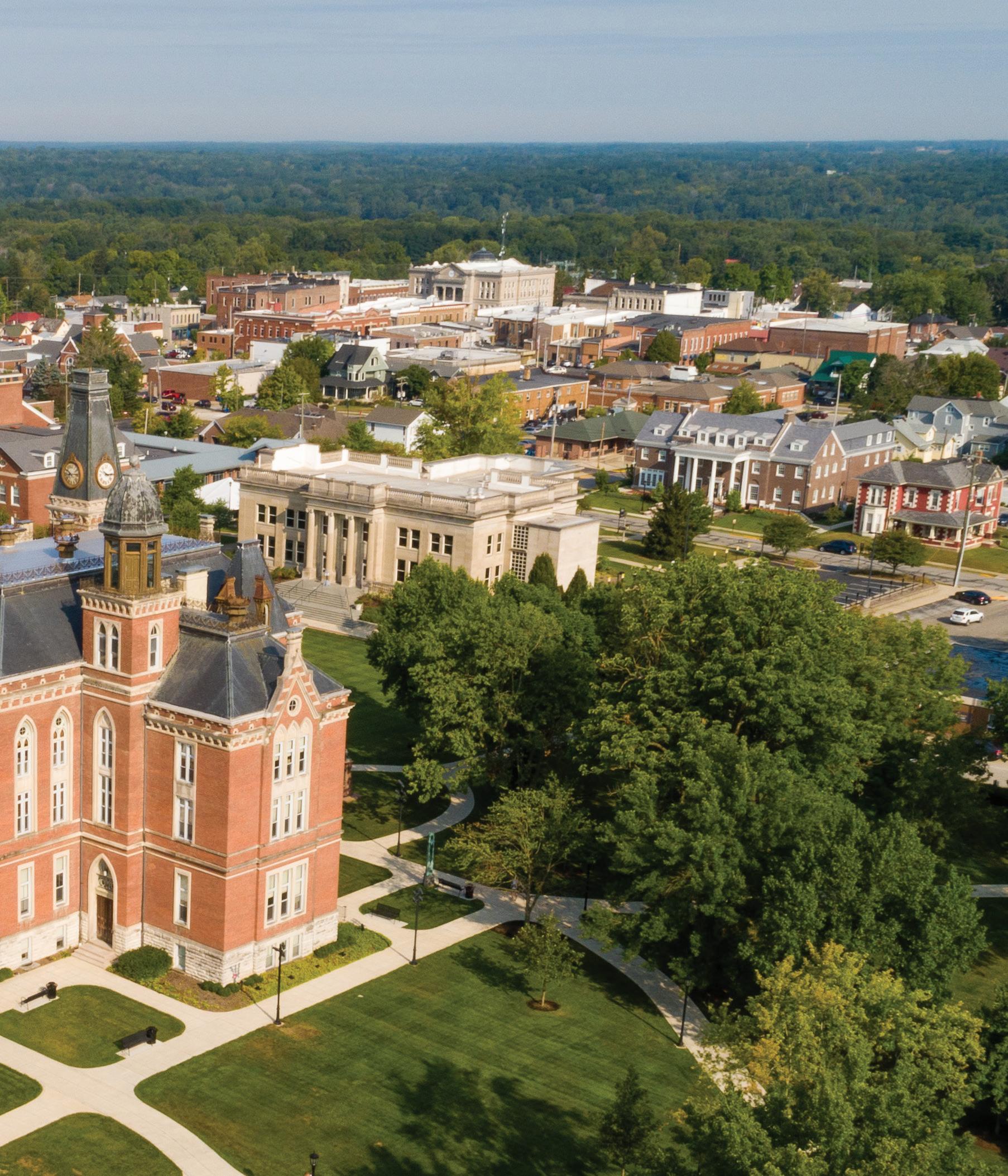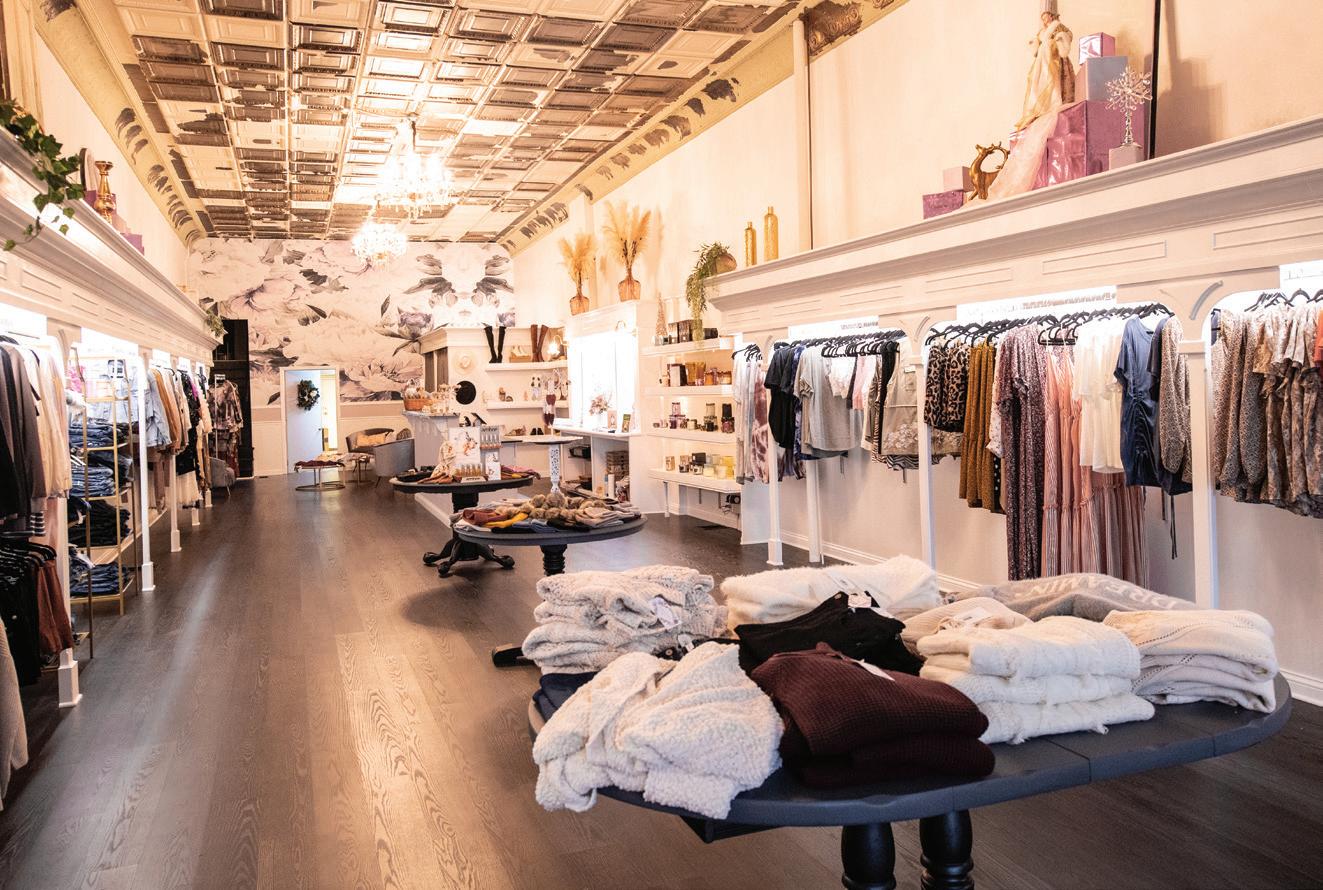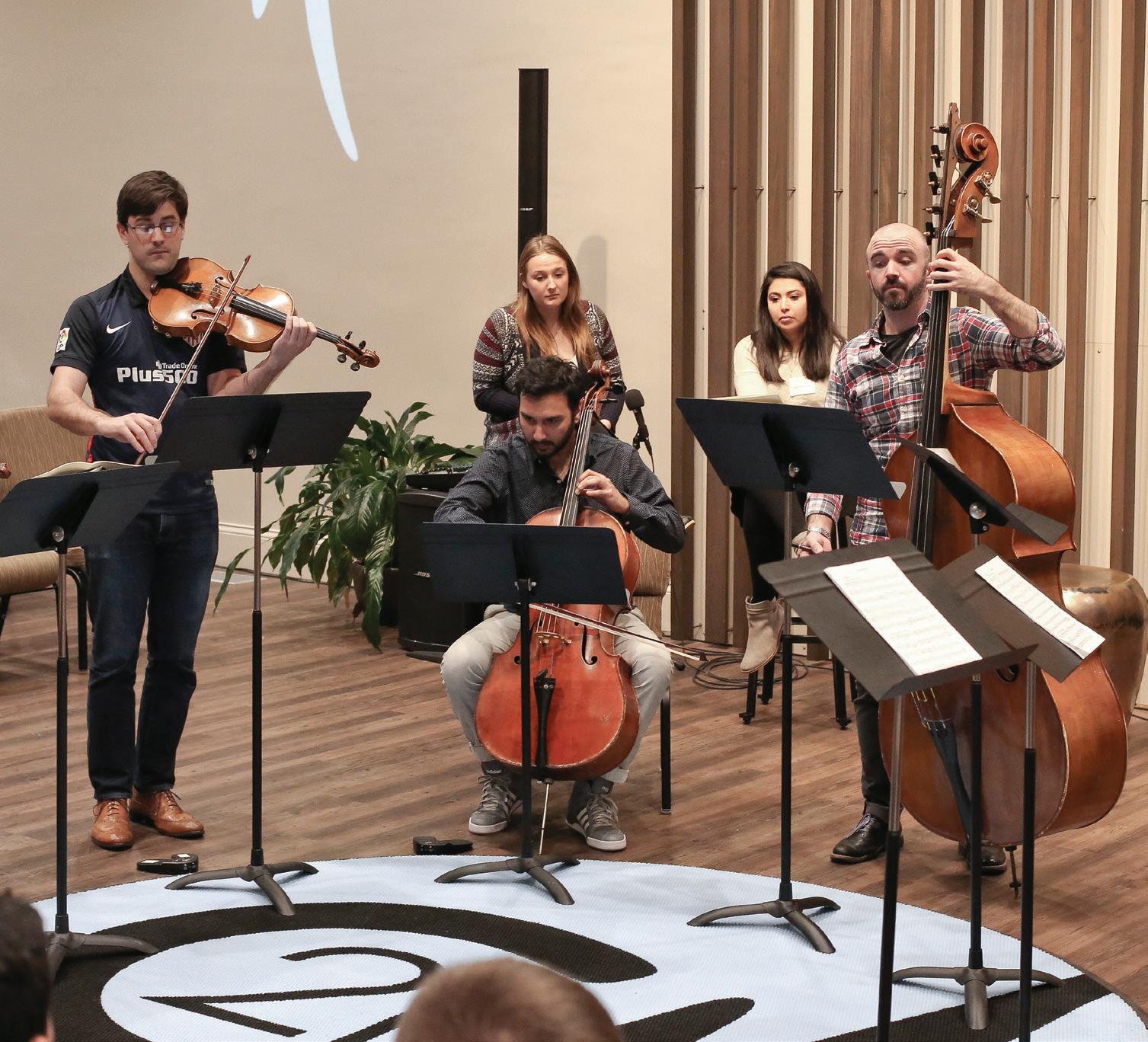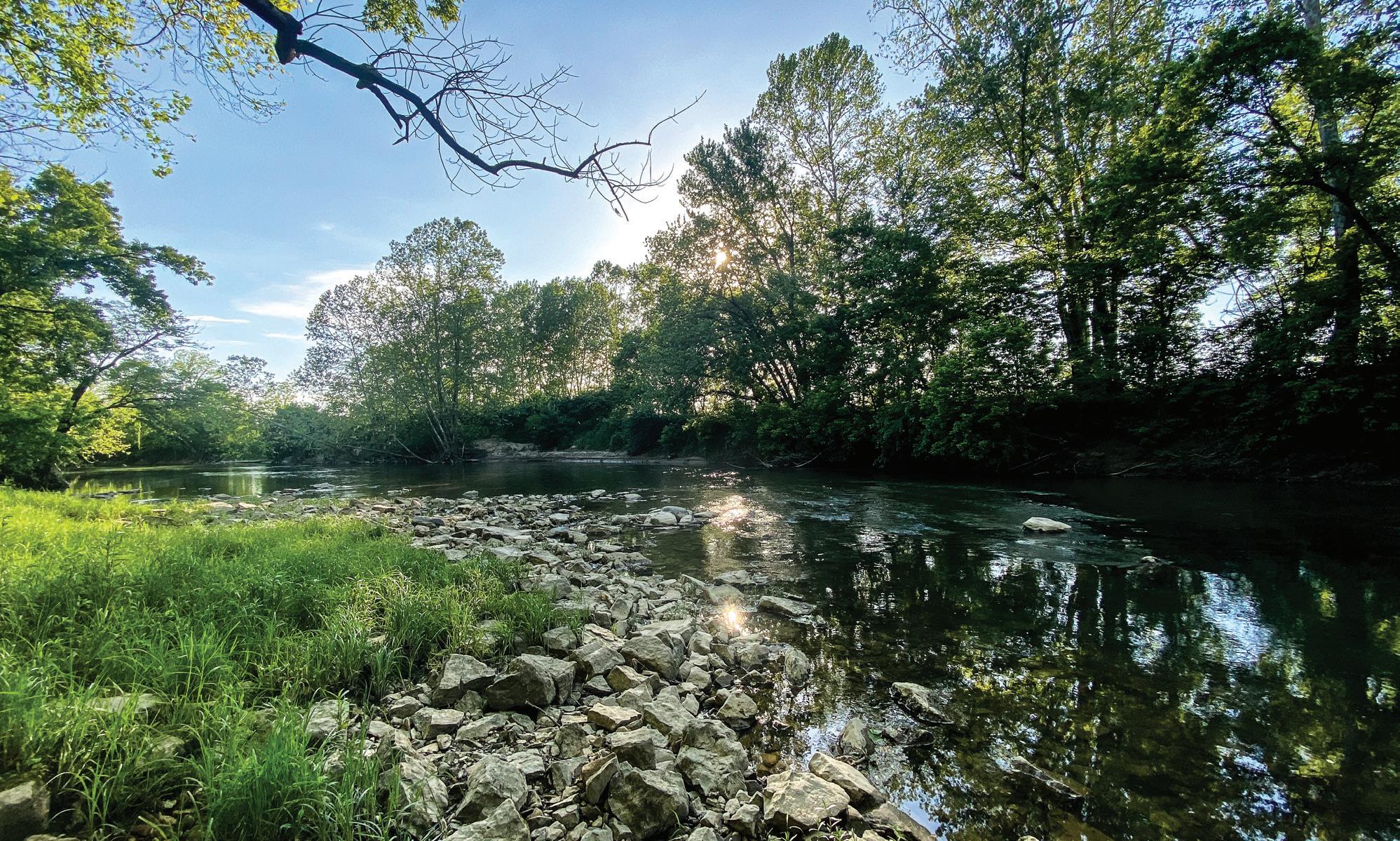
8 minute read
Town-gown: How to find common ground on common ground
TOWN-GOWN
It seemed to Joyce Taglauer Green ’75 and her late husband Judson ’74 that a wine bar serving pizza and pasta should bear an Italian name.
But nothing struck them as they pondered what to call their new Greencastle establishment. Maybe, they thought, the name should have something to do with the city and its environs.
“Our goal, we kept saying, is to connect people, to bring people together,” Green said. “… We came up with ‘Bridges’ because bridges do connect. There are multiple covered bridges around the area, and that cinched it. We said, this would mean something to the community.”
When Bridges Craft Pizza and Wine Bar opened in August 2017 at 19 N. Indiana St. on the square, not only did it represent the Greens’ first venture into restaurant ownership, but their latest contribution to improving the towngown relationship between Greencastle and DePauw University.
Such investments are “truly a magnet for visitors from outside the county,” said Eric Freeman ’84, tourism director at the Putnam County Convention & Visitors Bureau. “In promoting the county to prospective visitors, we heavily leverage the high quality of life here. The neat thing is we all get to live that life every day in this unique and enjoyable place.”
Freeman’s advice for improving the town-gown relationship? “Rarely is ‘maintain the status quo’ a positive answer, but to continue improving relationships within the community, everyone needs to keep doing what they’ve done for the last decade,” he said. “In the last 10 years, the university and county leaders have done so much to intentionally engage each other and their constituents that Putnam County has become an awesome place to both visit and reside.”
The Greens, who had given significant sums to the university in 2005 and 2013, shifted their focus in 2015 when they invested in the city and explicitly tied the investment to DePauw. They bought the former Goodwill building at 21 N. Indiana St.; renovated it to become Music on the Square, a performance center for faculty recitals, student performances and storytelling; and then gave it to DePauw.
Thereafter, Joyce Green mused that it’d be nice for people who attended a concert to be able to get a glass of wine afterward. That led to Bridges. Then last
How to find common ground
on common ground By Mary Dieter
October, BreadWorks by Bridges, the Greens’ retail and commercial bakery and lunch bistro, opened at 2 E. Walnut St. In between, the Bridges team took over operations at TapHouse Burgers at 24 S. Indiana.
The couple, who met at DePauw and were married nearly 45 years when Judson died last Aug. 31, were aware that colleges and the small towns in which they are located don’t always get along, so they invested specifically to improve DePauw’s relationship with Greencastle.
“When we were at DePauw, the town-gown issue was there,” Green said. “It was there very strongly. We referred to someone as a ‘townie.’ It wasn’t very nice … Things that the School of Music has done – more performances that are offered to the community – strengthen the connection. For me and for Judson, we wanted to strengthen that connection and make it a more positive situation.”
Lee Tenzer ’64 likewise has invested in community assets to benefit DePauw. He bought three downtown buildings and in one created the Tenzer Hub for Entrepreneurship, a business incubator where entrepreneurs, especially DePauw graduates, can collaborate. The COVID-19 pandemic has thwarted the plan, however, and at the moment the hub rents space to all comers.


Tenzer invested in Almost Home, a restaurant on the square. And he purchased the Windy Hill Country Club golf course, renamed it Tiger Pointe and is renovating its clubhouse to provide event space. He said it’s unlikely he would make those investments if he didn’t have the ulterior motive of supporting DePauw.
Tenzer said he is interested in improving towngown relations because too many universities and their communities “just don’t really see eye-to-eye, and they should because they can help each other.”
DePauw President Lori S. White and Greencastle Mayor Bill Dory, however, do see eye-to-eye on the need for a good town-gown relationship.
“We have grown up together – the city and the university,” White said. “Our success as a university depends upon the success of our town, for it to be a vibrant, thriving place to live, to work, to shop, and I know the town hopefully takes full advantage of all of the things the university has to offer.”
Said Dory: “When I was doing economic development, the fact that DePauw was here was at the top of my list in selling the community. … It is very important that we have a great working relationship, and certainly Greencastle would not be the community it is if DePauw did not exist here in the community. It is a wonderful asset and I encourage our citizens to take advantage of it whenever they can.”
In 2011, the state chose Greencastle to receive a Stellar Communities grant, from which the city realized about $15 million in benefits, Dory said. DePauw partnered with the city to apply, and the grant was used to spruce up the Anderson Street gateway to the university, do streetscaping on Vine and Indiana streets and beautify storefronts on the square. It also provided the funds to co-locate Starbucks and the Eli’s Bookstore there.
These days, the city provides DePauw with fire protection, street repairs, snowplowing on public streets that intersect campus and some street lighting. The city and DePauw’s police departments back up each other. Putnam County provides ambulance service to campus.
“We’re trying to do our best here at the city to support campus,” Dory said. One project, construction of a community center on the east side of town, will include a YMCA fitness facility. It is set to open in January 2023 and “will offer that family programming that a new faculty or staff member can enjoy and become integrated in the community,” Dory said.
Meanwhile, DePauw, with 664 full- and part-time employees, is the third- or fourth-largest employer in Greencastle, depending on seasonal employment of local companies. The university contributed intermittently to the city’s fire department and last year began what is intended to be an
Photos, starting with top left, then clockwise: Bridges Craft Pizza & Wine Bar; BreadWorks by Bridges; Conspire: Contemporary Craft; Eli’s Bookstore; Tiger Point event center; Tenzer Hub for Entrepreneurship.











Photos: Top left, then clockwise: DePauw Nature Park; Starbucks; Greencastle’s square seen from atop Bridges; First Friday; Music on the Square. annual contribution of $25,000-$30,000, said Bob Leonard, DePauw’s vice president for finance and administration.
The Inn at DePauw and Ashley Square Cinemas, both owned by DePauw, benefit the city, Leonard said. So do the DePauw Nature Park, the Richard E. Peeler Art Center, newsmakers’ lectures and music and theatre performances. Even Hoover Dining Hall was open to the public until the pandemic hit.
Music students often sing or play at churches and other students volunteer through various academic programs, centers and Greek organizations. Some teach Spanish, others read to school children. Most participate through the Hartman Center for Civic Engagement, which reported that, in 2019-20, 243 students volunteered through the Bonner Scholar Program, the Jane and David Stone First-Year Civic Leadership Program and other initiatives, giving 16,696 hours of time that was worth $121,046.
The community also is served through coursework. For example, in a winter-term course taught in January 2020 by marketing professional Vin Hoey ’65, students developed marketing plans and consulted with six Greencastle businesses and nonprofits.
“I was very impressed with the plan the students put together,” said J.D. Grove, owner of Conspire: Contemporary Craft.
The university considers good town-gown relations so important that Leonard meets monthly with the mayor. Among other things, they’re discussing ways to create housing that will help DePauw recruit faculty and staff members.
Town-gown relations also are a topic under discussion during the ongoing strategic planning process, in which Eric Wolfe ’04, a Greencastle real estate broker who volunteers for several DePauw organizations, wanted to be involved “to ensure the plan included a focus on the community and campus connections, and addressed local housing concerns.”
Wolfe said the town-gown relationship “is much better than it was 10 years ago. So much has happened in the last decade: We have seen DePauw engage with the local schools more; DePauw and its alumni brought the town big economic development wins with downtown restaurants and the bookstore and coffee shop being relocated to the downtown square; and there seems to have been more communication and outreach from both the town and DePauw leadership in tackling issues of mutual interest. …
“We will have achieved the best relations between DePauw and the local community when people in both groups see themselves as members of both groups,” he said. “I believe this is best realized when there is a critical mass of DePauw faculty, staff and alumni living in Greencastle and investing in the daily life of the town in such a way that an outsider wouldn’t be able to tell the difference between a ‘DePauw person’ and a ‘Greencastle person’ because we are all engaged and caring neighbors.”









